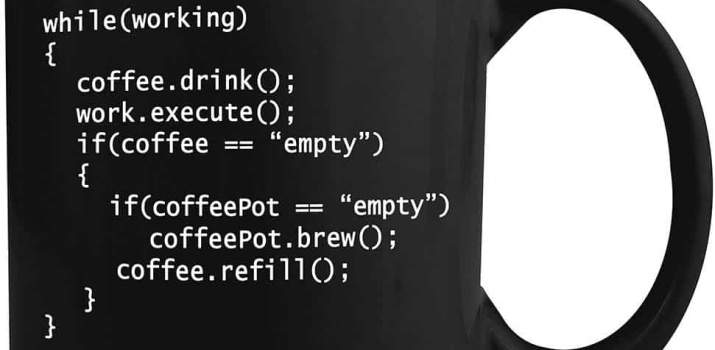What’s the daily life of a programmer like?
A programmer’s daily life consists of auditing and debugging code, coding new software, and monitoring the performance of finished programs. What’s more, a programmer has to be in constant communication with coworkers, clients, and their boss. The average developer’s work day spans across 8 hours.
Read on to learn about the 12 realities of a programmer’s life:
1. You Attend Daily Stand Up Meetings

This is often overlooked when you think about what a developer’s life is like. We all picture the lone wolf coding away in front of his computer.
But there’s a significant social aspect to programming jobs:
Each and every day you’re having meetings to discuss your current project and your next steps. You’re brainstorming with your team, you’re asked to report on your progress, or you present new features.
So even if you’re a more extraverted person, or you need your daily dose of talking to people, you find that in a programming job – in spite of the stereotype.
2. You Spend a Lot of Time Solving Problems as a Programmer
Being a software developer means solving problems, and applying the solution using code.
It’s what most of your daily work life revolves around:
You get handed an outcome that needs to be achieved. Then it’s up to you to come up with a course of action to achieve that outcome.
Software developers are sought-after and command high salaries because they excel at this high-level approach – essential for effective problem-solving.
They’re much more than “code automatons”.
3. You’re Learning Every Day
The nature of the job is that you’re constantly confronted with new problems. Some of these require a skill you don’t yet have – so you go and learn it.
But you’re already used to that from your journey to becoming a software developer:
- Mastering programming from the ground up
- Developing skills in new languages
- Sharpening your problem-solving abilities
– these have turned you into a superlearner.
A developer’s life is spent reading books and blogs, browsing code repositories and taking apart other people’s programs to copy their code principles.
4. You Drink a Lot of Coffee
It’s a cliché, but also true: Many programmers drink large amounts of coffee every day.
One reason is to combat lack of sleep. But mostly it’s because caffeine puts your brain into high gear. As a developer, it feels great to have your greatest tool become even more activated.
Easy to see why so many programmers are addicted to coffee!
Of course there’s always exceptions to the rule. If you don’t drink coffee at all while you’re coding – that’s great.
After all, you do “go into debt” borrowing extra “unearned” energy from your body. And if you push it too far, you can crash.
5. You Communicate With Other Developers
Every day you’ll have a back-and-forth with your programmer coworkers.
- You make sure everyone is working in the right direction
- You coordinate current and future tasks
- You show your progress and compare notes
In your life as a programmer, you’re working together on tough problems and important projects. This means you’ll grow close with your coworkers. From this can spring friendships that go way beyond the job.
Again, soft skills are an important part of your working life as a developer. The better you communicate with others, the better you can address problems, coordinate actions, and motivate your peers.
And that leads to projects being finished more quickly and with higher quality.
6. You See Opportunity Everywhere
Because you’re looking at life through a problem-solving lens, you keep seeing ways things could be improved by using a piece of software.
Many programmers have gotten rich by following these hunches, building out prototypes and releasing them to the public. In general, applying the software engineering mindset to other areas of life can lead to great success.
To be a smart programmer is a gift. No matter what you go after – be it climbing the career ladder, becoming a world-traveling freelancer, or launching your own startup – your chances of success are higher than average.
7. You Can Have a Life Outside of Coding
Yes, many programmers are so obsessed with coding that they dedicate their whole life to it, almost 24/7. After they get home from work, they start on their personal side projects – and don’t quit until it’s time to go to bed.
But not all programmers don’t have a “real life”.
The typical developer job is 40 hours per week or less. So you still have a bunch of free time. And how you spend it is your choice.
It’s true that coding attracts “nerdy” personalities – those that like to play games, browse the internet, or keep coding during their free time.
If you want though, you can have a perfectly outgoing, active, and adventurous life as a programmer. You just need to want that kind of lifestyle badly enough and set some goals to achieve it.
8. Your Life as a Programmer Can be Stressful
Everything takes twice as long as you think. Sometimes you go down a particular path with your code, only to realize it doesn’t work and you need to start from scratch. You uncover a lot of bugs you’ll need to fix during debugging.
Your clients are often not empathetic with regards to your work as a programmer. They can’t grasp how difficult it is, and they look for results ASAP.
And when you’re starting to solve a problem from a high-level perspective, it’s often hard to pin down every small part of the solution and give a realistic time frame for each.
The result is that as a developer, your life is spent chasing deadlines. It’s one of its not-so-pleasant realities.
You need to be cut out for this kind of work:
Fired up by challenges, determined to push through against all odds.
9. You Support Your Client’s Software
After you’ve launched your newly-created software, your job is not done.
Oftentimes you’re asked to provide continuous support for the program. This includes customer service, frequent testing for bugs, and adding new features.
To make your life as a developer easier, it’s a good idea to create a quality product the first time – so your task list for servicing it becomes much shorter.
Companies need someone they trust looking after their software. So be prepared to always have this be part of your working days as a developer.
10. Your Lifestyle at Work is Sedentary
As a software developer, you spend most of your day sitting down, staring at a screen – often with bad posture.
If you want to keep your body healthy, you need to take serious steps to combat this sedentary lifestyle:
- Take frequent “eye breaks”
- Consider a standing desk
- Adjust your posture often
- Get up and walk around once in a while
Without using tactics like these to stay fit as a developer, developing conditions such as “coder’s neck” is inevitable, unfortunately.
Also be as active as possible in your free time:
Take walks, play a sport, go to the gym. This way you can reverse the negative impact of a daily life spent sitting.
11. You Take Home Good Money

One of the perks of programmer life: The great take-home pay.
Software developers have always been in high demand, and increasingly so. It’s a skill that makes companies millions of dollars. And it’s an advanced skillset – not everyone has the guts to learn programming to a good level.
For these reasons, software developers are earning between $60,000 and $120,000 per year. Freelance programmers can command hourly rates over $100.
So even if the job is stressful, the monetary benefits might be worth it:
If you’re making a six-figure salary, you can afford a nice lifestyle.
12. You Can Go Remote or Freelance
Working as a programmer doesn’t have to mean being stuck in a corporate office all day.
Software development is a type of job that’s well-suited to being taken remote – and there’s lots of those offers out there.
Alternatively you could strike out on your own – living the freelance lifestyle.
Then you’re combining the great pay with the freedom to work from wherever you want and set your own hours.
Your Path to Living the Programmer Life
To speed up your way to living the programmer life, check out the free checklist “The 4 Most Important Skills for a Software Developer”:










